Hay Festival #4: 7 Fiction Writers on Writing

Elif Shafak, author of ‘Honour’ – longlisted for the Women’s Prize for Fiction.
‘If there’s a dynamism in the book world in Turkey it is precisely because women read a lot.’
Elif Shafak would like to see more Turkish books translated into Kurdish. ‘I was mesmerized when I came to Hay that the road signs are in English and Welsh. Maybe one day in Turkey we will have Turkish and Kurdish road signs.’ Her country operated, she said, on the basis that ‘everyone is Turkish. We adopted the French approach.’
Shafak presented this year’s Raymond Williams Lecture at Hay Festival in association with PEN International. She writes in both English and Turkish and her latest novel Honour was longlisted for this year’s Women’s Prize for Fiction (now sponsored by Baileys). Here’s my review of Honour.
Commenting on the book business in Turkey, she said, ‘If there’s a dynamism in the book world in Turkey it is precisely because women read a lot, and they share the stories they like… If a man tells me he likes one of my books I know it is his wife or sister who made him read it… We need to question that men write and women read. The more patriarchal a society the more visible is this gender demarcation.
‘Women have always been transmitters of memory, from grandmothers to granddaughters. In the written culture their voices diminish. This is very sad.’
As a child, she told the audience, she was fascinated with one particular letter in the Turkish alphabet – the silent ‘g’. ‘I think this is the reason in fiction that I am drawn to characters who are minorities, from sub-cultures, castaways, mavericks, those who are silenced. And that is a political act.’
Lydia Davis was awarded the Man Booker International Prize just before her talk at Hay Festival, which I reported on last week. On the subject of her writing process she had this to say: ‘I’m very afraid of planning; afraid that planning will paralyze the story. It’s a very difficult balance. I tend to let one thing suggest the next.’
Amit Chaudhuri is an author, academic and musician. He’s well known as an Indian classical musician as well as being a composer of experimental music. And he was a Booker International judge in 2007. ‘Impulsive branching out,’ he said, was part of his writer’s DNA.
‘The question is how much of these different selves do you want to excavate, to keep in play. I decided to use them rather than stay with the persona I acquired in the 1990s as a novelist… When I returned to India I wanted to de-professionalize myself as a novelist. A publisher wants a novelist to produce a book every two to three years,’ he said. ‘I didn’t want to go down that route.’
He cited Ian McEwan as the ‘novelist par excellence.’ He observed that some of the idiosyncratic side of British culture was side-lined under Thatcher and Blair. ‘Novelists became more mainstream – Amis, McEwan…’
Then he took the audience by surprise: ‘Some aspects of the novel bore me deeply – character, plot…’
Chaudhuri’s latest book is Calcutta – Two Years in the City.
Francesca Segal’s The Innocents won the 2012 Costa First Novel Award. I asked Francesca if it was a difficult decision to have a male protagonist for her first novel. She replied that she was unsure throughout the writing process if she’d created a convincing male voice and couldn’t gauge if she’d pulled if off. But clearly she did. According to Segal, in The Innocents she explored the difference between ‘what you want and what has been wanted for you.’

Collum McCann, author of Transatlantic.
‘I like a female protagonist. Women somehow have bigger, baggier emotional wardrobes.’
In an echo of this remark by Segal, Irish novelist Collum McCann questioned the old adage: Write what you know: ‘Write towards what you want to know.’ (I completely agree with that). And on the subject of protagonists he said, ‘I like a female protagonist. Women somehow have bigger, baggier emotional wardrobes.’
Writers on writing – comic novels
All writers are fundamentally dissatisfied with the world,’ said Jonathan Coe, speaking at a joint event with Catherine O’Flynn. Writing a novel, he said, ‘offers a temporary catharsis’. Coe and O’Flynn gave free advance reading copies of their comic novels to every member of the audience.
Expo ’58 is Coe’s tenth novel. Writing that number of novels, he said, created a particular problem: ‘I feel I’m running out of names for my characters.’ In Expo ’58 he dodged this dilemma by creating a narrative around a character, Thomas Foley, from his previous novel The Rain Before It Falls. Coe wanted to place him in his mid-30s during the 1950s. So he sent Tom to the 1958 Word Fair in Brussels, centred on the iconic modernist Atomium. (I’ve nearly finished this novel and it’s a lovely read – an innocent abroad, a tale of espionage with a gentler pace than your usual spy thriller, a 1950s clash of modernist and conservative values, and funny).
A member of the audience asked the two writers how they tested the humour in their novels. ‘It’s impossible to check if the humour is working,’ said O’Flynn whose novel Mr Lynch’s Holiday is set in a near-deserted expatriate resort in Spain. ‘I’ll chortle away and then subject my husband to the rushes. But I cut back some of the comic bits because too much comedy can be tiresome.’
According to Coe, ‘It’s really lovely when you think of a comic moment.’ And he reflected: ‘In fact The Rain Before It Falls was my easiest book because it had no comedy at all.’
Expo ’58 represented a break with tradition for Coe: ‘It’s the first time I’ve written sequentially.’ (That came as a surprise to me.) And O’Flynn added, ‘I have quite a lot of problems trying to write sequentially. I wrote the first chapter of Mr Lynch’s Holiday early and I was constantly rewriting it.’ In the end she reverted to writing chunks of text out of sequence.
I’ll give the last word to Jonathan Coe: ‘There’s a vein of melancholy in both our works. Both books are quite sad so don’t be fooled that (our readings) have entertained you.’
Phew. That’s covered a lot of ground but there’s more to come including six fantastic women authors who appeared at Hay Festival with Commonwealth Writers.


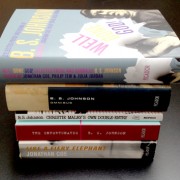
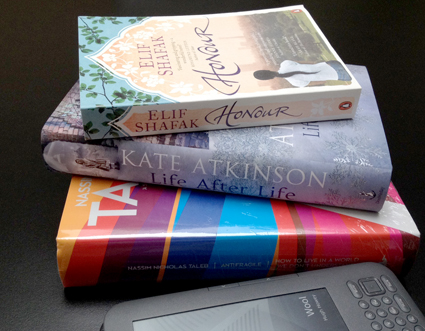

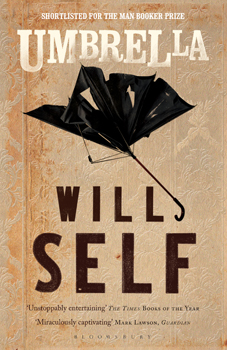

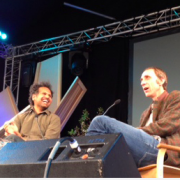


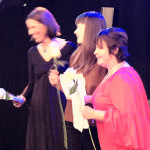
Trackbacks & Pingbacks
[…] Festival and I was impressed. Also on the list is Colum McCann for TransAtlantic. My tweet about Colum’s remark at Hay went (almost) viral: ‘I like a female protagonist. Women somehow have bigger, baggier emotional […]
Leave a Reply
Want to join the discussion?Feel free to contribute!